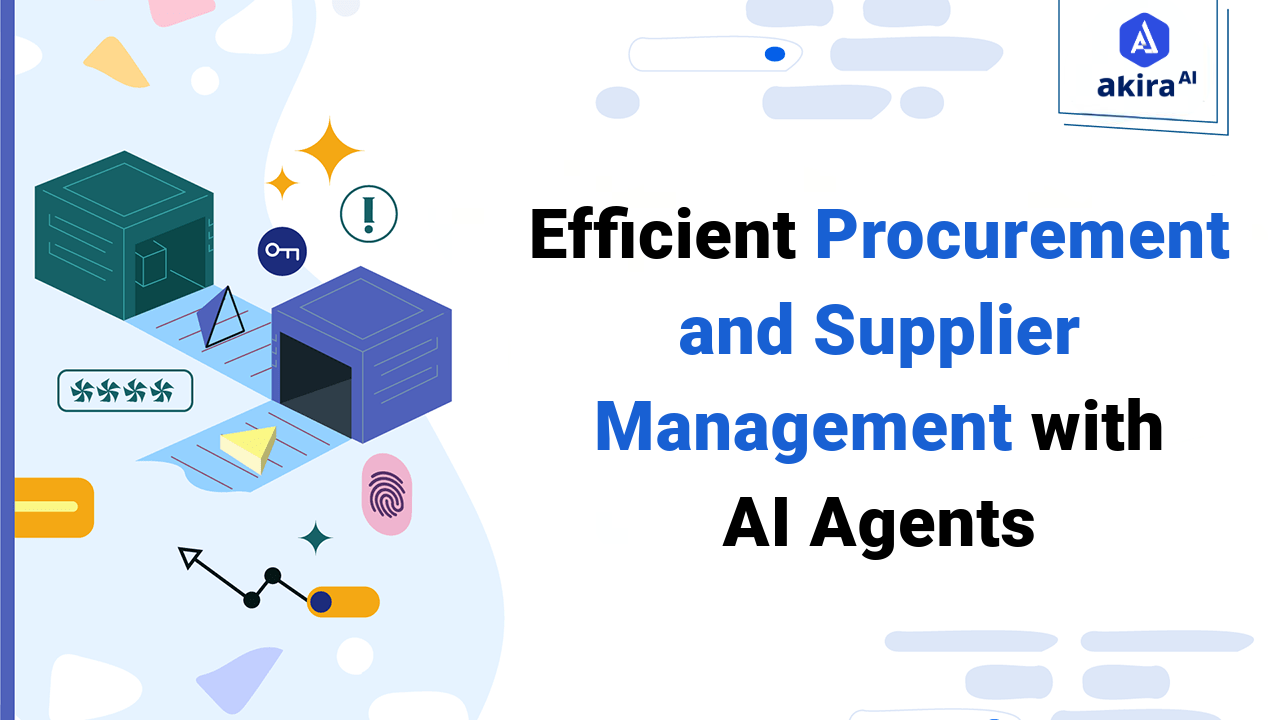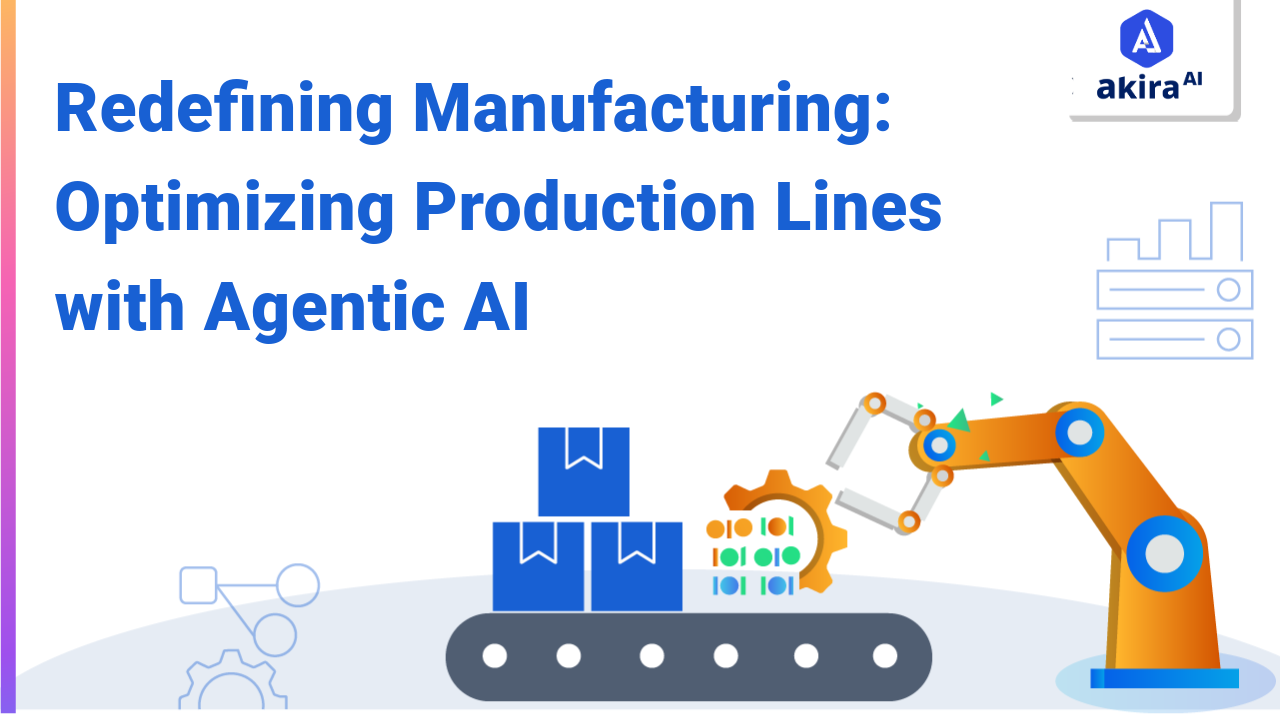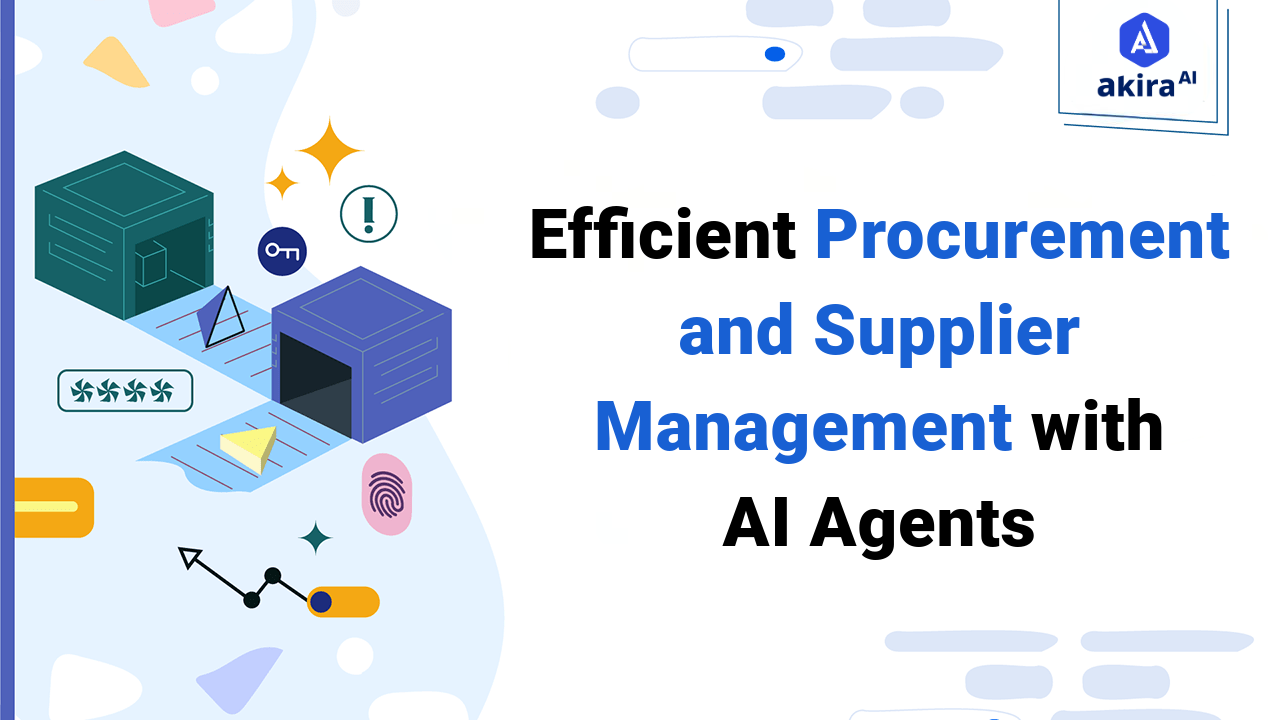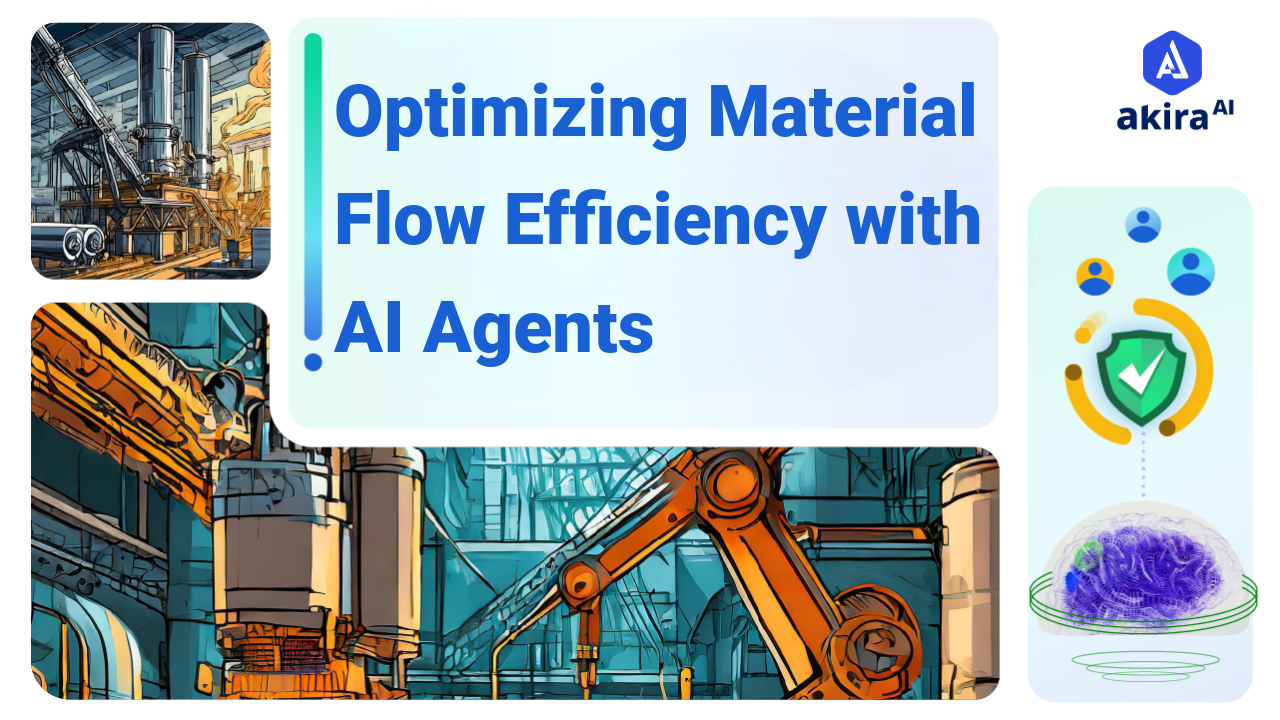Key Insights
-
AI revolutionizes procurement by streamlining workflows, automating manual tasks, and enabling real-time decision-making for improved supplier management.Through predictive analytics and machine learning,
-
Agentic AI helps organizations forecast demand, evaluate suppliers objectively, and mitigate supply chain risks.As
-
AI tools evolve, procurement will increasingly integrate automation, advanced forecasting, and sustainability, reshaping industry standards and driving long-term growth.

In today’s manufacturing market environment, the role of acquisition and control of suppliers greatly consumes market competition. Since organizations already focus on areas of innovation and low cost, they rely on AI to affect these important aspects of procurement. AI has great potential to revolutionize procurement by innovations involving the automation of tedious functions, enhancing decision-making, and improving supplier relations.
In the following part of this blog, we will discuss the nature and types of impacts of AI agents on altering the buying behaviour of manufacturers and their suppliers. After that, we will outline the next section on best practices for strategic purchasing and the future norms that manufacturers should watch out for.
What is Procurement and Supplier Management?
Procurement
Procurement is the process of acquiring goods and services from external suppliers. It involves identifying needs, selecting suppliers, negotiating contracts, and managing purchases. Effective procurement ensures the right products at the best price, quality, and time, helping businesses reduce costs and improve efficiency.
Supplier Management
Supplier management is the process of selecting and working with suppliers to ensure they provide quality products on time and at a fair price. It involves monitoring supplier performance, managing risks, and maintaining strong relationships. Effective supplier management helps businesses reduce costs, improve efficiency, and meet quality standards.
Traditional Procurement vs. Agentic AI Procurement and Supplier Management
To understand the impact of AI on procurement, it is essential to compare traditional methods with AI-based approaches.
|
Aspect |
Traditional Procurement |
AI-based Procurement |
|
Data Analysis |
Manual data processing |
Automated data analytics |
|
Decision-Making |
Subjective and often inconsistent |
Data-driven, objective decision-making |
|
Supplier Selection |
Based on past relationships and reputation |
Performance metrics and predictive analytics |
|
Efficiency |
Time-consuming and prone to errors |
Streamlined workflows, faster turnaround |
|
Risk Management |
Reactive measures |
Proactive risk assessment with real-time monitoring |
Impact on Customers Due to Traditional Methods
Traditional procurement methods often lead to several issues that affect both manufacturers and their customers:
-
Delayed Response Times: Manual processes and subjective decisions can slow down product delivery, causing longer wait times for customers.
-
Inconsistent Product Quality: Relying on past relationships over data-driven insights can result in inconsistent product quality, impacting customer satisfaction.
-
Higher Costs: Without predictive analytics, manufacturers may miss cost-saving opportunities, leading to higher prices for customers.
-
Limited Supplier Collaboration: Traditional systems can hinder proactive communication, causing misalignments in production and inventory, affecting timely delivery.
-
Risk of Supply Chain Disruptions: Reactive risk management increases the chance of supply chain issues, leading to stockouts or delays for customers.
AI-powered procurement offers more efficiency, better quality control, and stronger supplier relationships, leading to improved customer satisfaction.
Akira AI Multi-Agent in Action
 Fig1: Architecture Diagram of Procurement and Supplier Management
Fig1: Architecture Diagram of Procurement and Supplier Management
Data Collection Agent
The Data Collection Agent serves as the foundation of the AI-driven procurement system. It is responsible for gathering data from various sources to ensure a comprehensive understanding of the procurement landscape. This includes:
-
Supplier Databases: Collecting information about potential and existing suppliers, such as their financial health, product offerings, and historical performance.
-
Market Trends: Monitoring industry reports, news articles, and economic indicators to stay updated on market conditions that could impact supply and demand.
-
Internal Performance Metrics: The collection of internally generated data regarding purchasing habits, stock levels, and performance appraisals of suppliers.
Data Analysis Agent
The Data Analysis Agent leverages machine learning algorithms to process the data gathered by the Data Collection Agent. Its primary functions include:
-
Pattern Recognition: Identifying trends and anomalies in supplier performance and market conditions, helping organizations understand what factors contribute to successful procurement.
-
Insight Generation: Producing actionable insights based on data analysis, such as predicting future supplier performance or identifying cost-saving opportunities.
-
Continuous Learning: Using feedback loops to improve its analytical capabilities over time, ensuring the insights generated become increasingly relevant and accurate.
This agent transforms raw data into meaningful information that can guide strategic decisions.
Supplier Evaluation Agent
The Supplier Evaluation Agent focuses on assessing potential and existing suppliers based on a set of predefined criteria. Its key responsibilities include:
-
Criteria Assessment: Evaluating suppliers based on metrics such as quality of products, pricing, reliability in delivery, and customer service.
-
Scorecards and Ranking: Creating scorecards to quantitatively measure and rank suppliers, facilitating easier comparisons and selections.
-
Ongoing Monitoring: Continuously tracking supplier performance to ensure they meet agreed-upon standards and take action if any issues arise.
By using objective metrics, this agent helps organizations make informed supplier selections, reducing reliance on subjective judgments.
Contract Management Agent
The Contract Management Agent automates critical aspects of the contract lifecycle, ensuring that supplier agreements are efficiently managed. Its main functions include:
-
Drafting Contracts: Automatically generating contract templates based on organizational policies and supplier specifics, which reduces manual effort and errors.
-
Negotiation Support: Providing insights and analytics to support negotiations, such as historical pricing data or supplier performance records.
-
Monitoring Compliance: Tracking contract terms and ensuring that both parties adhere to the agreed-upon conditions, such as delivery schedules and quality standards.
Use Cases of Procurement and Supplier Management
AI applications in procurement are diverse and increasingly sophisticated. Here are some notable use cases:
Supplier Risk Assessment: There are also AI tools applied to processes to consider the further stability and performances of the suppliers. For example, such informational application areas can be applied to risk evaluation of companies’ financial standing and delivery dependability, to avoid supply chain problems.
Cost Prediction: In cost control, it is also possible to predict cost and gain accurate results with the help of predictive analytics. Using historical records and the overall trend of the marketplace, AI can recommend the best approaches to pricing and availing of the set budget.
Automated Procurement Processes: AI Agent in procurement includes automated job descriptions like order processing, invoice matching, etc., so that procurement proficient can work more on strategic procurement work.
Performance Monitoring: Suppliers’ KPI monitoring through AI on an ongoing basis will ensure the organization maintains the highest quality of goods and services while holding suppliers accountable.
Demand Forecasting: Through the use of such algorithms, manufacturers are able to forecast demand in the future to determine when to restock and which products they need to restock in order to minimize on costs of holding inventory.
Benefits of Supplier Management
The operational benefits of integrating AI agents into procurement processes are substantial:
-
ROI Improvement: Organizations using AI in procurement can achieve a 20-30% return on investment by lowering costs and improving supplier interactions.
-
Workload Automation: By 2025, AI agents are expected to manage 80% of procurement tasks, significantly easing the workload for procurement teams.
-
Productivity Gains: It can enhance workplace productivity by up to 30% by streamlining processes and tasks.
-
Efficiency Boost: Implementing AI can increase procurement efficiency by 25%, leading to stronger buyer-supplier relationships
AI agents are revolutionizing quality control in manufacturing by providing real-time defect detection, enhancing operational efficiency, and driving significant cost savings, making it easier for manufacturers to deliver high-quality products consistently.
Technologies Transforming Procurement with AI Agents
Several technologies are pivotal in transforming procurement processes through AI agents:
-
Machine Learning: Enhances predictive performance regarding supplier reliability and future demand, enabling organizations to make more efficient decisions.
-
Natural Language Processing (NLP): Facilitates easier responses to supplier inquiries and improves the extraction of information from submitted documents.
-
Blockchain: Provides security for transactions, which is critical for building and maintaining strong supplier relationships.
-
Cloud Computing: Supports real-time collaboration and access to procurement data from anywhere, enhancing flexibility and responsiveness.
-
Internet of Things (IoT): Connects devices and sensors to provide real-time data on inventory levels and supply chain conditions, improving visibility and decision-making.
-
Augmented Reality (AR): This can be used for visualizing products and assessing their quality during procurement processes, especially in complex supply chains.
How AI Agents Supersede Other Technologies
The future of AI in procurement looks promising, with several trends expected to shape the landscape:
-
Increased Integration of AI Tools: The use of automation in procurement functions is expected to increase in the future as more organizations operate the use of AI software in procurement functions.
-
Advanced Predictive Analytics: It also outlines how more organizations will depend on AI for better and improved forecasting skills in the forecasting of demand, and averting risks.
-
Improved Supplier Collaboration: AI will improve genuine-time communication with the suppliers, and hence the relations will be better and more equated.
-
Sustainability Focus: AI will help organizations find sustainable suppliers and practices, which also points to the fact that sustainability has now become a decisive factor in procurement choices.
-
Continuous Learning: There will be improvements in machine learning which means procurement will continue to become more intelligent and automated each passing year.
Next Steps in Manufacturing
Talk to our experts about implementing AI agents for efficient procurement and supplier management, leveraging automation and data-driven insights to optimize supplier relationships, improve decision-making, and enhance overall supply chain efficiency.


